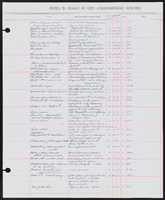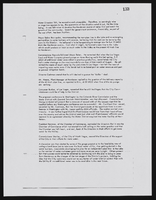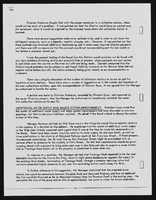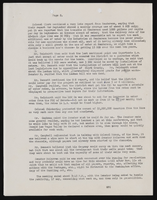Search the Special Collections and Archives Portal
Search Results
Davis, Chester K., 1929-
From: https://uwf.edu/library/library-collections/chester-davis-music-collection/
I, Chester Davis, was born in Long Beach, California, June 22, 1929.
There was always music in the home. Two maiden aunts who visited regularly, encouraged their nephew to sing songs. He had a good ear and sang in tune. The wind-up "Victrola" was regularly heard playing Stephen Foster and Victor Herbert.
Person
Maureen Lewis oral history interview
Identifier
Abstract
Oral history interview with Maureen Lewis conducted by Hillery Pinchon on March 17, 2006 for the Hurricane Katrina Survivors in Las Vegas Oral History Project. In this interview, Lewis first describes her upbringing as one of eleven children, raised in the home her father built in New Orleans, Louisiana's Lower 9th Ward, the area of the city hardest hit by Hurricane Katrina. She then begins to describe the events in the days leading up to the landfall of of the hurricane, as she stayed behind in New Orleans with her eldest son and a cousin as most of the family evacuated to Alabama. She relates how she and the cousin were able to leave the city after the initial impact of the storm, but her son was one of the hundreds trapped on an interstate bridge for several days without food or water. She continues talking about the response of the Federal Emergency Management Agency (FEMA), about people who were forced to commute between Alabama and New Orleans to keep their jobs, sky-rocketing rents, the inadequate state and local response to the emergency, and the strong response of the American Red Cross. She then describes her move to Las Vegas, Nevada with her son, his financee, and their child, and ends with some comments on questions how much racial prejudice played into the tragedy in New Orleans.
Archival Collection
Chuck Johnson oral history interview
Identifier
Abstract
Oral history interview with Chuck Johnson conducted by Barbara Tabach on November 17, 2021, December 15, 2021, and January 14, 2022 for the Veterans Oral History Project of Southern Nevada.
Chuck discusses his enlistment in the Army at the age of 16 and his tours of duty during the Korean and Vietnam Wars. He shares stories from his 21 year military career and talks about post-traumatic stress disorder (PTSD), his injuries, and how the Servicemen's Readjustment Act of 1944 (G.I. Bill) helped him to settle in Nevada.
During his second interview session, Chuck reflects on his time spent in Korea and how he came to establish the Korean War Memorial in Boulder City, Nevada. He shares more stories from his service in Vietnam and Germany. Chuck also talks about his family's history and his mother's family tree.
During his third interview session, Chuck shares more memories of serving in Korea and Vietnam, especially the Tet Offensive attacks during the Vietnam War. He recalls stories from his childhood, including leading his high school's ROTC Color Guard for President John F. Kennedy hours before the President's assassination.
Subjects discussed include: MASH; Agent Orange
Archival Collection
Audio clip from interview with Nathaniel Whaley by John Grygo, March 6, 2013
Date
Archival Collection
Description
In this clip, Nathaniel Whaley talks about the differences between the opportunities for weekend entertainment for black and white young people in Las Vegas in the 1940s and 1950s.
Sound






